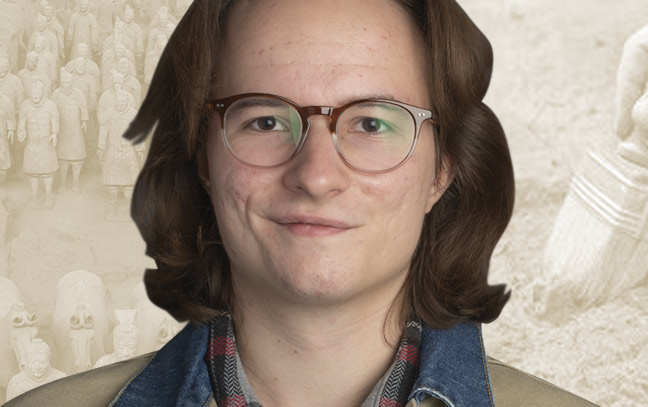
Preserve the Past as an Applied Archaeologist
You know archaeology and are ready to make it your career. With an Applied Archaeology MA from IUP, you’ll gain the techniques and skills you need to step onto a site, understand the legal requirements, and advance your career.
In addition to a broad knowledge of archaeological laws, ethics, and cultural and heritage management, the Applied Archaeology graduate program at IUP focuses on:
- Discipline-specific knowledge in specialties such as forensics, zooarchaeology, geoarchaeology, and historic preservation
- Technical training in standard and emerging technologies in archaeology
- Extensive hands-on experience in both field and laboratory setting
With your master’s degree in hand, you’ll be well-prepared to work as a professional archaeologist.
Why Pursue a Master’s Degree in Applied Archaeology?
Applied archaeology is the use of archaeology to address real-world problems. This could mean a variety of opportunities:
- Crafting laws to protect heritage sites
- Developing tourism sites
- Identification, reburial, and preservation of unmarked graves
- Recording archaeological sites before they are destroyed by development
- Recovering lost Armed Service members
The MA in Applied Archaeology program is about training you to become an archaeologist—and a great one at that. You’ll learn from our faculty, who are experienced teachers, active archaeologists, and leaders in the field. They care about your success and are ready to guide you each step of the way.
Mastering Cultural Resource Management
IUP is regarded as one of the top universities in the US in training CRM archaeologists. CRM is one of the fastest-growing sectors within archaeology. States across the nation see the need for preserving historical artifacts and sites to promote tourism or safeguard sites within development projects.
There is a growing need for more trained archaeologists who know and maintain state and federal regulations. You’ll have a competitive edge that gives you more to offer.
What You’ll Learn
The Applied Archaeology MA program focuses on learning by doing. You’ll be trained in technical skills such as:
- Historic and Precontact artifact ID and analysis
- Geoarchaeological methods
- Faunal analysis
- Forensics and osteological analysis
- Geophysical survey methods
And you’ll develop the writing skills to prepare reports and publications. Your master’s thesis can be a CRM report or a policy study of a cultural resource issue.
Imagine Your Future
More than three-quarters of American archaeology is conducted by applied archaeologists, but few archaeologists are trained to do this type of work. That’s why 90 percent of IUP’s applied archaeology graduates find work in their chosen field—because they can do it. And so can you.
You can also go on to PhD programs, work in museums, and work with nonprofits.
Two Paths of Archaeology
Archaeology jobs are usually found in two major sectors. The first is what most people think archaeologists do: professors or museum curators.
The other sector is in cultural resources management. CRM investigations are required by law, so your work as a professional archaeologist is needed in transportation, energy, and military projects. As America expands, so does the need for trained archaeologists.
You’ll also find a growing need for archaeologists in tourism. Cultural and historic preservation are key parts of heritage tourism, one of the fastest-growing segments of the industry. It’s an economic boom, and archaeologists lead those research efforts.
Industries Looking for You
Cultural resource management, historic preservation, engineering, and environmental firms across the US are looking to hire applied archaeologists. Many IUP applied archaeology graduates go on to work for private consulting firms, along with state and federal agencies, such as
- Bureau of Land Management
- Federal Highway Administration
- National Forest Service
- National Park Service
- State Departments of Transportation
- State Historic Preservation Offices
Career Opportunities in Archaeology
The type of jobs that are most common for Applied Archaeology MA graduates include:
- Cultural Resource Management
- Documentary filmmaking
- Education/outreach
- Environment and natural resources
- Forensics
- Law/criminal justice/law enforcement
- Museum/curation/project design
- Social impact assessment
- Tourism/heritage
Job opportunities for archaeologists are expected to grow in this decade, and demand is expanding. Archaeology is number 7 in top science jobs! IUP's Applied Archaeology MA program has a very high placement rate. Approximately 95 percent of our graduates work in archaeology or a related field. More than 90 percent of American archaeology is conducted by applied archaeologists. Very few archaeologists are trained to do this kind of archaeology.
Archaeologists with a master's degree make between $55,000 and $70,000 per year, on average. Those with specialized training—for example, geophysics or geoarchaeology—make even more.
Median Salary in 2023
Number of jobs
Classes and Requirements
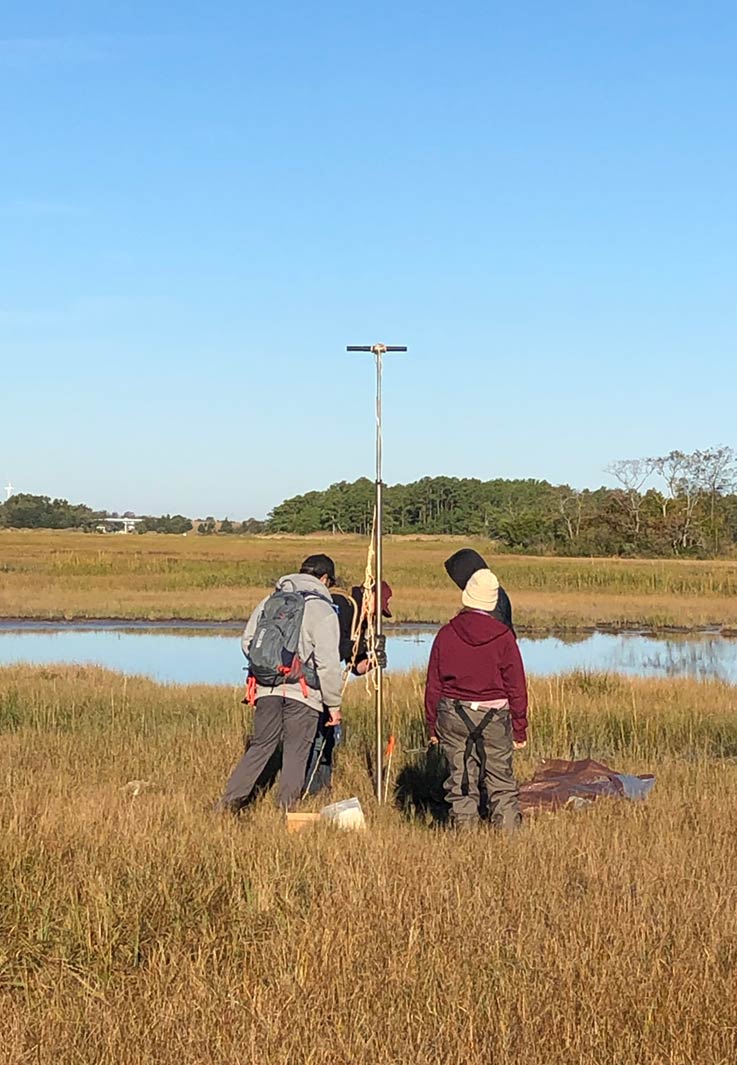 IUP’s Applied Archaeology program prepares you to meet the US Secretary of the Interior’s Professional Qualification Standards in Archaeology. This means your training at IUP sets you up to be a professional CRM archaeologist.
IUP’s Applied Archaeology program prepares you to meet the US Secretary of the Interior’s Professional Qualification Standards in Archaeology. This means your training at IUP sets you up to be a professional CRM archaeologist.
After completing the MA in Applied Archaeology program, all that remains to meet the Secretary of the Interior’s Professional Qualification Standards in Archaeology is one full year of experience as a project supervisor. Many students meet this requirement before graduating, through prior experience, experience while in the graduate program, or a combination of the two. We can help you find opportunities to meet this qualification if you choose.
The program welcomes applicants from a variety of backgrounds and academic backgrounds, including archaeology, anthropology, history, geology, geography, and museum studies. While there is no prerequisite coursework for the program, we do require a six-week (or equivalent) North American archaeological field school. The requirement can be completed at IUP or another university. Prior CRM experience may partially or fully substitute for this experiential requirement.
What You’ll Study
The Applied Archaeology MA totals 36 hours of graduate coursework. Your core courses and electives give you the depth and breadth of archaeology that you’ll need in your work, such as:
- Historic and precontact archaeological history of North America
- Cultural Resource Management
- Technical report writing; project management, budgeting, and accounting; National Register nomination; and project proposal development
- Archaeological laws and ethics
Your thesis or internship will help you put it all together and expand your professional, project management, and supervisory skills.
With a few extra courses, you can also earn a certificate in Geographic Information Science (GIS) and Geospatial Techniques— skillsets that are highly desired in CRM jobs.
Full Academic Catalog Listing
The course catalog is the official reference for all our degree and course offerings. Check it out for a full listing of the classes available and requirements for this degree.
- Loading...

Ryan Clark M’13, Applied Archaeology
IUP's graduate program integrates a diverse pool of anthropological faculty of archaeologists, curators, historians, and geospatial researchers to train students in a truly interdisciplinary way.
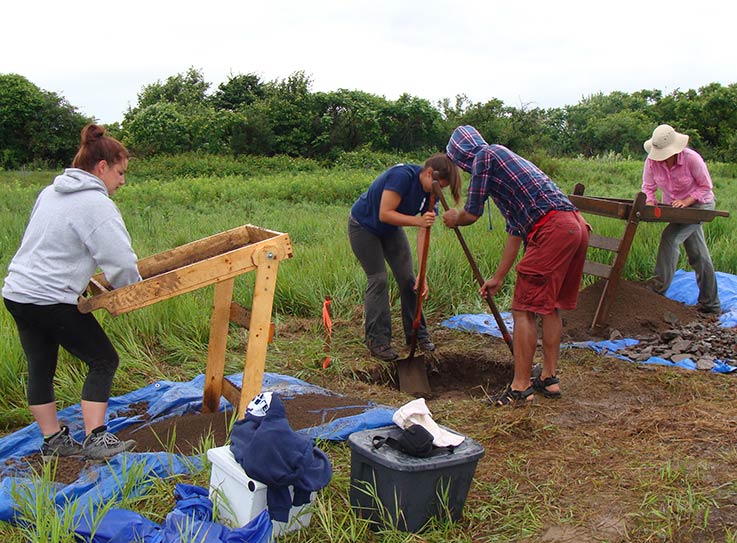
Get Experience in Archaeology—and Get Paid
Archaeological sites in Pennsylvania hold more than 15,000 years of history. You can work with IUP Archaeological Services and help unearth that history.
IUP Archaeological Services is a research center that provides technical help to agencies in field and laboratory projects throughout Pennsylvania.
The center is the administrator for the Pennsylvania Highway Archaeology Survey Team (PHAST) and DCNR Cultural Crew. Working with Pennsylvania’s Department of Transportation and the Department of Conservation and Natural Resources, you’ll help conduct surveys and background research as a part of the National Historic Preservation Act’s Section 106 compliance process. Both programs are led by an IUP field director/full-time graduate assistant, and both hire a crew of three interns each summer.
The center also hires students for a full range of projects, including:
- Artifact analysis
- Excavation
- Geoarchaeology
- Ground penetrating radar
- Historical research
- Surveying
IUP Archaeological Services has conducted more than $8 million in projects, working with
- Allegheny National Forest
- Indiana County
- National Park Service
- Pennsylvania Historical and Museum Commission
- Pennsylvania Department of Transportation
- Pennsylvania Department of Environmental Protection
- Township planning commissions
- US Army Corps of Engineers–Pittsburgh District
When you take part in this unique opportunity, you’ll get real experience that leads to real jobs—and you are paid for your work.
Contact Professor William Chadwick, wchadwic@iup.edu, for more information.
Professional Advisory Board for Applied Archaeology
As part of the applied archaeology master’s program, you’ll be supported by a board of professional archaeologists who represent private companies, state and federal agencies, and Native American nations. The advisory board connects students with job opportunities and helps ensure the program is actively responding to the needs of the archaeology industry.
Boost Your Skills with a Geographic Information Science and Geospatial Techniques Certificate
As you’re taking electives in the applied archaeology program, you can apply certain classes toward the Geographic Information Science (GIS) and Geospatial Techniques certificate. These tools are widely used in cultural resource management and are highly marketable skills employers look for.
Alumni
Applied archaeology alumni work throughout Pennsylvania and the mid-Atlantic and across the US as
- Archaeologists
- Museum professionals
- Preservationists
- Teachers
IUP alumni work for local, state, and federal government, as well as private and nonprofit consulting firms and resource advocates.
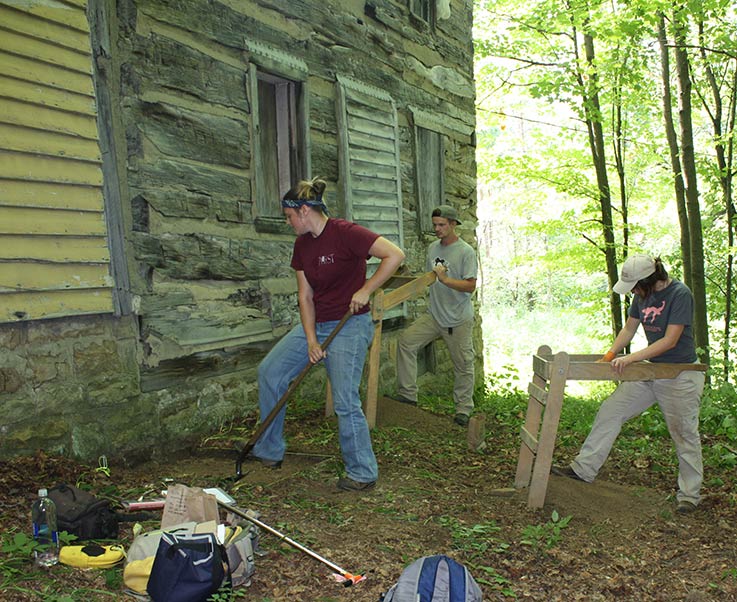
Archaeology Research Opportunities
When you’re in the Applied Archaeology MA program, you can participate in archaeological work that’s happening in western Pennsylvania and throughout the country. It’s a great way to apply what you’re learning while gaining hands-on experience in the field.
Here are a few of the projects IUP is leading:
South Mountain metarhyolite
Study geochemical and archaeological analysis of precontact quarries within the South Mountain landscape to understand ancient trade.
World War II aircraft
In partnership with the Defense POW/MIA Accounting Agency, participate in forensic investigations of downed WWII aircraft.
Historic frontier settlements
Take part in ongoing archaeological excavations at the sites of Hanna’s Town (the first British county seat west of the Allegheny Mountains) and Newport village to explore frontier life in Pennsylvania.
Pennsylvania Archaeology Shipwreck Survey Team
Work with volunteers to record the submerged history of Lake Erie.
Mobile Spatial Data Acquisition and Processing Lab, Geophysical Technologies
Use a full suite of geophysical equipment (ground penetrating radar, magnetometry, electrical resistivity) to identify and investigate a range of archaeological sites, from precontact villages to cemeteries and historic foundations.
National Park Service projects
Participate in ongoing archaeological projects at National Park Service sites, including Fort Necessity and the Johnstown Flood.
Late Monongahela Squirrel Hill site
Work at the Late Monongahela Squirrel Hill Site and excavations, geophysical investigations, and artifact analysis of a precontact Native American village.
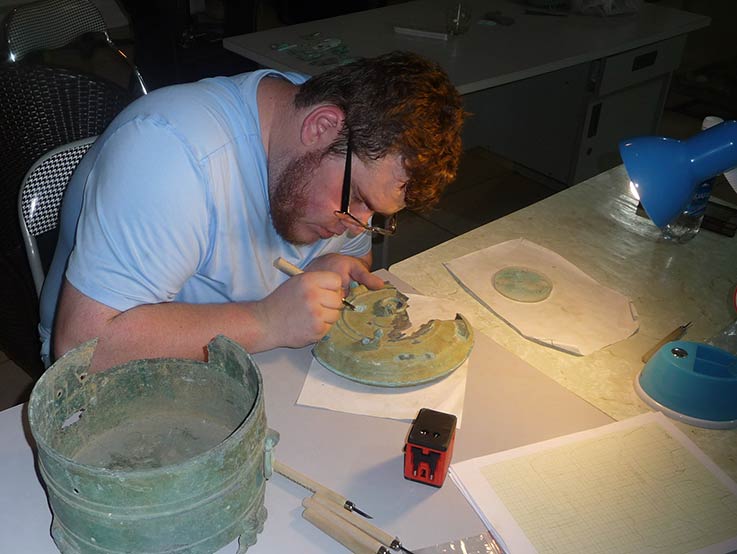
Use All the Tools of the Trade
As a graduate student in applied archaeology at IUP, you’ll have access to state-of-the-art tools that are invaluable for archaeological work. IUP’s laboratories and technology are available for your research.
Laboratories
- Archaeology Analysis Lab: includes comparative collections of precontact and historical artifacts
- Chemical Characterization Lab: includes a portable X-ray fluorescence unit, petrographic microscope, and scanning electron microscope
- Geoarchaeology Lab: includes augers, mechanical Ro-Tap sieve shaker, drying ovens, and standard geologic sieves
- Geospatial and Geophysics Processing Lab: includes geographic information system (GIS) and geophysical software
- Faunal Analysis Lab: includes animal bone comparative collection
- Flotation and Wet Lab: includes flotation and soil science
Technology
These are used in classes and available for student research.
- Electrical resistivity
- Ground-penetrating radar
- Large-format printers
- Magnetometry
- Magnetic susceptibility
- Photogrammetry
- Portable X-ray fluorescence (chemical characterization)
- Total Data Station
- Trimble Handheld GPS units
Application Options and Early Graduate Admission
Early Graduate Admission
IUP anthropology majors can benefit from an early graduate admissions program. You can take up to 40 percent of the master’s program while still an undergraduate. This can let you complete both an MA and a BA in approximately five years, saving you money and time—and you’ll enter the workforce a year sooner. This provides you with a clear track to employment in archaeology.
The Early Admission program also allows Shippensburg history BA degree students to begin graduate coursework during their last year as undergraduates (at Shippensburg), finishing their MA at IUP in two additional semesters and a summer. Students must have a 3.0 GPA to apply for the program and must maintain a 3.0 GPA through graduation.
Guaranteed Admissions Agreements
The Anthropology, Geospatial and Earth Sciences Department at IUP has guaranteed admissions agreements in place with Kutztown University of Pennsylvania. Students from the anthropology programs at these universities can apply to the IUP MA in Applied Archaeology program for free. If you meet the minimum qualifications, you are guaranteed admission.
Apply Anytime
Students who enter the program usually hold a bachelor’s degree in anthropology, history, geography, or a related field. Depending on your undergraduate coursework, you may be required to take courses as a condition of your admission to prepare for the program, especially participation in an archaeological field school.
There is no deadline for admission. Student applications are reviewed on a rolling basis. To be fully considered for financial aid, including graduate assistantships and departmental scholarships, applications should be submitted by February 1.
Faculty
Applied archaeology faculty specialize in
- Environmental and coastal archaeology
- Cultural resource management
- Forensics
- Geoarchaeology
- Geophysics
- Heritage management
- Historic preservation
- Historical archaeology
- North American archaeology (in particular the Northeast, mid-Atlantic, Midwest, and Southeast)
- Spatial analysis and GIS
- Underwater archaeology
- Zooarchaeology
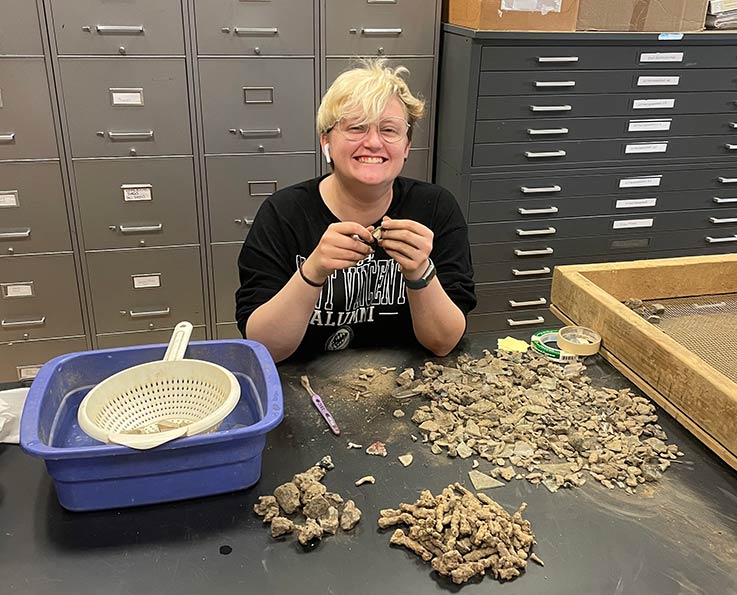
Become a Graduate Assistant
Graduate assistantships are a great way for you to get hands-on archaeology experience while making your master’s program even more affordable. IUP’s graduate assistant programs are available for both in-state and out-of-state students.
Here’s some of what graduate assistants do:
- Analyze and curate archaeological collections
- Conduct soil flotation, and sort microartifacts and botanical remains
- Historical research
- Develop archaeological programming for the public and school groups
- Supervise weekly artifact labs
- Author the program blog, Trowels and Tribulations, and contribute to archaeology’s social media presence
Recognition and Rankings
-
The IUP Applied Archaeology MA program is the first academic program in the United States to be recognized by the American Cultural Resources Association for its success in preparing students for employment in cultural resource management. It is one of only 19 programs listed.
-
IUP’s Applied Archaeology MA program also ranked in the top three registered professional archaeologist-producing schools in 2021. Over half of our graduates go on to become RPA-certified.
-
The American Cultural Resource Association recently began recognizing academic programs that prepare students for success in Cultural Resource Management. There are currently only 21 recognized programs, and IUP was placed first on the list. All recognized programs are evaluated by ACRA professionals to determine how well the program prepares students for a career in CRM.
Statement on Race and Diversity
The Anthropology, Geospatial and Earth Sciences Department is committed to combating racism through fostering inclusive and welcoming spaces for diverse students and fostering student learning outcomes that expand the understanding of race: particularly, that race is not a biological reality, but that race and racism are cultural and social constructs that intersect with social class and other forms of social positionality to produce harm for people of color in our society and globally.

